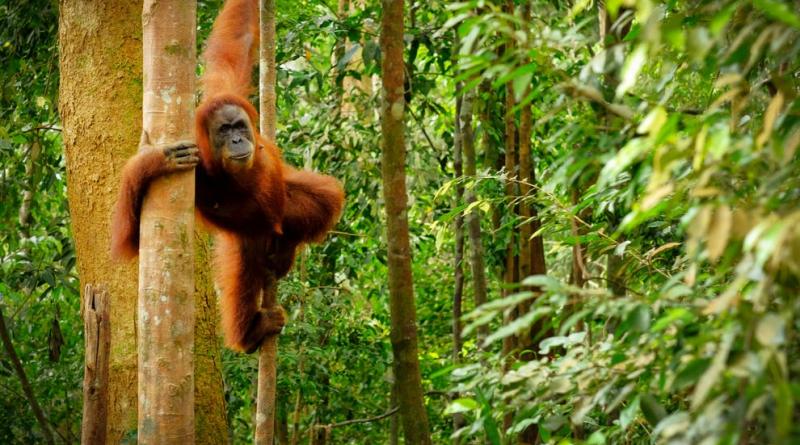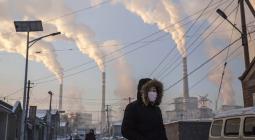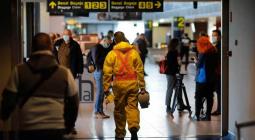Everyday shopping from brands like Heinz and Yakult helps destroy rainforests, report claims.

Big companies and lenders ‘failing to halt loss of vital tree cover’, contributing to nature and climate crises.
Shoppers are unknowingly fuelling the destruction of tropical rainforests, as companies produce millions of everyday products linked to deforestation, a report claims.
Brands including Kraft Heinz, Starbucks, Yakult and Rachel’s Organic buy large amounts of products such as soya to feed animals – for which swathes of tropical forests are cleared.
And nearly 100 major financial institutions, including Blackrock, are ignoring tropical deforestation in their public policies, while providing $2.7 trillion (£2 trillion) that risks fuelling the climate and biodiversity crisis, the analysis says.
Every six seconds an area of rainforest the size of a football pitch is destroyed to produce commodities such as soya, beef, palm oil, leather, timber and paper, according to environmental organisation Global Canopy.
Destroying these forests is one of the biggest causes of the twin climate and biodiversity crises.
The charity’s annual Forest 500 Report looked at 350 companies worldwide that produce, trade or use the largest amounts of those products, and their lenders, and ranked them by their relevant policies.
It found that 107 companies whose products use meat, fish, dairy and eggs failed to recognise their links to deforestation through the soya they bought for animal feed.
They included Kraft Heinz, which produces cheeses and creams, and Starbucks, which uses millions of gallons of milk a year.
Almost 80 per cent of the world’s soya crops are fed to livestock in the meat and dairy industries, experts have estimated.
The researchers said neither Yakult nor Groupe Lactalis, which owns Rachel’s Organic, had any promises to end deforestation; Kraft Heinz had no deforestation pledges for soya, beef or pulp and paper; and Starbucks had no deforestation policy for soya.
Overall, a third of the companies driving trade in these commodities have made no public promises to avoid deforestation, the study said.
By contrast, companies that have published a deforestation policy for the commodities they use include Unilever, Marks and Spencer, Sainsbury's and Morrison’s.
Global Canopy also examined the policies of the institutions financing the big brands through bonds, loans and shareholdings worth $5.5 trillion (£4 trillion). And it found 150 top banks and lenders had not published any policies to ensure the companies were not adding to deforestation.
They include four of the world’s biggest asset managers such as BlackRock, according to the report.
Niki Mardas, executive director of Global Canopy, said: “There is no solution to climate change without a solution to deforestation. Yet a great majority of the world’s largest financial institutions are looking the other way on this vital issue.
“Some are making big announcements on climate change, while failing even to have a deforestation policy in place.
“This doesn’t add up, and it sends a terrible message to the market. Strong policies are a basic first step, setting clear expectations for the companies they finance, and demonstrating a strategic approach to the climate and nature crisis.”
Deforestation and land use change are major contributors of damaging greenhouse gas emissions, according to the UN’s Intergovernmental Panel on Climate Change. It says about 23 per cent of global human-caused carbon dioxide emissions come from agriculture, forestry and other land uses, and land use change, such as clearing forests to make way for farms, drives these emissions.
The Intergovernmental Science-Policy Platform on Biodiversity has previously reported that changing land and sea use is the biggest factor behind the biodiversity crisis.
In the 2014 New York Declaration on Forests, governments and companies pledged to remove deforestation from their supply chains by 2020. But since then, average tropical forest loss has accelerated by 44 per cent, Climate Focus says, with an area larger than the UK lost each year, mostly because of agricultural expansion.
In a new YouGov survey for WWF, more than two-thirds – 68 per cent – of people supported setting a target date in UK law to eradicate all deforestation from supply chains, with 4 per cent opposing the idea.
More than three-quarters of people (77 per cent) said they did not want products they buy to contribute to deforestation abroad.
A spokesman for Kraft Heinz said its environmental social governance report sets out commitments, including sourcing palm oil that is 100 per cent certified sustainable and traceable to the mill by next year.
“Our partnership with the Rainforest Alliance has included an expanded forest risk commodities supply chain assessment to include soy, which is helping to determine next steps. Kraft Heinz remains dedicated to responsible sourcing and related impacts in critical areas including deforestation.”
A statement from Yakult said that “protecting the Earth’s environment is one of the most important missions we all share and we aim to demonstrate our commitment through all our activities”, adding: “We will continue to work on reducing the impact of the group on the environment, while also striving to improve the manner in which we publicise information related to these efforts.”
Blackrock referred to documents it has on sustainable agriculture and palm oil, adding: “We ask companies to disclose any initiatives and externally developed codes of conduct to which they adhere, and to report on outcomes.” A document on its plans for this year also says Blackrock will ask companies to show plans to align their business with the global goal of net-zero greenhouse gas emissions by 2050.
The Independent has also asked Lactalis and Starbucks to comment but had not heard back before publication.
31 January 2021
INDEPENDENT




